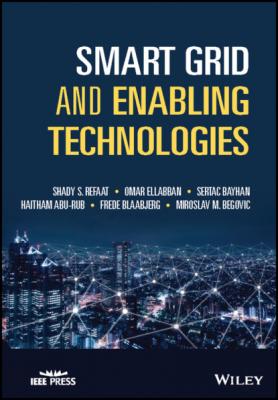Smart Grid and Enabling Technologies. Frede Blaabjerg
Читать онлайн.| Название | Smart Grid and Enabling Technologies |
|---|---|
| Автор произведения | Frede Blaabjerg |
| Жанр | Физика |
| Серия | |
| Издательство | Физика |
| Год выпуска | 0 |
| isbn | 9781119422457 |
23 15 On the Pivotal Role of Artificial Intelligence Toward the Evolution of Smart Grids 15.1 Introduction 15.2 Research Methodology and Systematic Review Protocol 15.3 Century‐Old Grid and Smart Grid Transition 15.4 Review of AI Methods 15.5 Major Applications of AI in Smart Grid 15.6 Challenges and Future Scope 15.7 Conclusion References
24 16 Simulation Tools for Validation of Smart Grid 16.1 Introduction 16.2 Simulation Approaches 16.3 Review of Smart Grid Planning and Analysis Tools References
25 17 Smart Grid Standards and Interoperability 17.1 Introduction 17.2 Organizations for Smart Grid Standardization 17.3 Smart Grid Policies for Standard Developments 17.4 Smart Grid Standards 17.5 Conclusion References
26 18 Smart Grid Challenges and Barriers 18.1 Introduction 18.2 Structure of Modern Smart Grids 18.3 Concept of Reliability in Power Systems 18.4 Smart Grid Challenges and Barriers 18.5 New Reliability Paradigm in Smart Grids 18.6 Summary References
27 Index
List of Tables
1 Chapter 1Table 1.1 A detailed comparison between conventional power grids and smart gr...Table 1.2 Investment costs of a fully functioning SG ($ M) [90]. Reproduced w...
2 Chapter 2Table 2.1 Potential benefits and technical limitations of biomass energy. Ada...Table 2.2 Types of geothermal resources, temperatures and their applications....Table 2.3 Advantages and disadvantages of different renewable energy resource...Table 2.4 Some negative environmental impacts of different renewable energy r...
3 Chapter 3Table 3.1 Characteristics of various energy storage systems.
4 Chapter 4Table 4.1 Commonly used energy storage technologies. Adapted from Ref Num [11...Table 4.2 Technical and economic characteristics of energy storage technologi...Table 4.3 Major energy storage applications.Table 4.4 Benefits of energy storage systems by users.Table 4.5 Energy storage applications with suitable technology.
5 Chapter 5Table 5.1 Some examples of AC microgrid systems (http://microgridprojects.com...Table 5.2 Typical examples of DC microgrid systems.Table 5.3 Comparison between AC distribution lines and DC distribution lines....Table 5.4 Comparison of centralized and decentralized control approaches. Ada...
6 Chapter 6Table 6.1 Overview of battery electric vehicles.Table 6.2 Comparison of different EV topologies. Ref Num [3].Table 6.3 The comparison of series and parallel HEV configurations. Ref Num [...Table 6.4 Existing battery technology, energy density, specific density. Ref ...Table 6.5 Battery capacity and technologies by various EV manufacturers. Ref ...Table 6.6 Charge methods electrical ratings.Table 6.7 US electric vehicle charging sites and stations. Adapted from Ref N...Table 6.8 Europe electric vehicle charging sites and stations. Adapted from R...Table 6.9 Comparison of V2G technologies.
7 Chapter 7Table 7.1 ZEB definitions summary.Table 7.2 Classifying nZEBs by renewable energy supply.Table 7.3 Energy savings potential using smart technology. Ref Num [13]. Repr...Table 7.4 Renewable energy technologies applications in nZEB.Table 7.5 Classification of algorithms for building performance optimization....Table 7.6 Summary of the three optimization algorithms' performance under six...Table 7.7 A building design framework using the optimization methods as a dec...Table 7.8 Community efficiency and renewable supply hierarchy.
8 Chapter 8Table 8.1 Benefits of advanced metering infrastructure. Adapted from Ref [4].Table 8.2 Usual QoS conditions of few representative kinds of traffic in SG c...Table 8.3 Comparison between wired communication technologies. Ref [17]. Repr...Table 8.4 Comparison between wireless communication technologies. Ref [17]. R...
9 Chapter 9Table 9.1 Time latency for SG applications [26]. Reproduced with permission f...Table 9.2 Main cyber security requirements for the SG. Adapted from Ref Num [...
10 Chapter 10Table 10.1 Typical big data sources [7]. Reproduced with permission from IEEE...
11 Chapter 11Table 11.1 The properties of load‐response programs [8]. Reproduced with perm...Table 11.2 Price response program overview [8]. Reproduced with permission fr...Table 11.3 A brief description of each technique [18, 19].
12 Chapter 12Table 12.1 The core influence of SGs on electricity firms' business model inn...Table 12.2 Traditional and the smart utilities.
